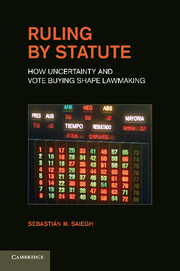Book contents
- Frontmatter
- Contents
- List of Figures
- List of Tables
- Acknowledgments
- PART I INTRODUCTION
- PART II THEORETICAL FOUNDATIONS
- PART III EMPIRICAL IMPLICATIONS
- 4 Measuring Chief Executives' Statutory Performance
- 5 Patterns of Statutory Policy Making Around the World
- 6 Political Prowess or “Lady Luck”?
- 7 Buying Legislators
- 8 Electoral Rules and Lawmaking
- PART IV NORMATIVE IMPLICATIONS
- PART V CONCLUSIONS
- PART VI APPENDICES
- Bibliography
- Index
7 - Buying Legislators
Published online by Cambridge University Press: 03 May 2011
- Frontmatter
- Contents
- List of Figures
- List of Tables
- Acknowledgments
- PART I INTRODUCTION
- PART II THEORETICAL FOUNDATIONS
- PART III EMPIRICAL IMPLICATIONS
- 4 Measuring Chief Executives' Statutory Performance
- 5 Patterns of Statutory Policy Making Around the World
- 6 Political Prowess or “Lady Luck”?
- 7 Buying Legislators
- 8 Electoral Rules and Lawmaking
- PART IV NORMATIVE IMPLICATIONS
- PART V CONCLUSIONS
- PART VI APPENDICES
- Bibliography
- Index
Summary
This book has thus far considered the different strategies that chief executives may use to induce cross-pressured legislators to adopt their preferred policy outcomes. It has also discussed how these strategies arise from the properties of statutes, and the manner in which they are produced: The content of a bill creates its own winners and losers, but the gains are not confined to those who voted on the winning side, nor are the losses confined to those on the losing side. A clever vote buyer can exploit this fact to her advantage. For example, a chief executive might be able to buy only a few votes and then benefit from “bandwagon” effects to obtain a majority of votes in support for her proposal. In fact, when legislators care about both policy and position taking, it might even be possible for the chief executive to get her proposal approved without having to offer any bribes.
Nonetheless, governments may sometimes need to incentivize legislators to support their policies, and may do so in a variety of ways. These incentives are ubiquitous in legislative policy making, and common terms such as “horse trading,” “arm twisting,” “influence peddling,” “back scratching,” and “deal making” are often used to describe the general phenomenon of vote buying. In many cases, votes are traded in exchange for favors, sinecures, or political rewards (e.g., better committee assignments).
- Type
- Chapter
- Information
- Ruling by StatuteHow Uncertainty and Vote Buying Shape Lawmaking, pp. 114 - 132Publisher: Cambridge University PressPrint publication year: 2011



